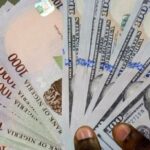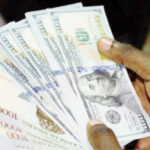As the Monetary Policy Committee (MPC) meets Monday and Tuesday, there are posers over a relief for the weakening naira or the speedy inflationary rise, which has prevailed despite a $38.7 billion external reserve.
Just at the weekend, the naira crashed to N720 per the United States Dollar (USD) on the black market being the lowest so far while it also fell on the official Import and Export (I&E) market to N436.33/$.
- Pipeline contract: Bayelsa gov wades into Tompolo, Asari, Ateke clash
- Dangote Cement promo star prize winner gets N5m in Jos
Based on the exchange rate at the parallel market, which many say is a window for the price discovery of the local currency, the Naira has lost about 49.6 per cent of its value in less than three years, from barely N360/USD to the current exchange rate of N714/USD, around which it was trading on Sunday.
Another poser for Nigeria is the efficiency of the foreign reserve, which according to experts is a barometer for measuring a country’s capacity to meet foreign currency obligations.
According to the International Monetary Fund (IMF), countries with adequate reserves generally avoided large drops in output and consumption during economic troughs, as adequate external reserves provide the tool and capacity to handle inevitable capital outflows during global economic recessions or shocks, without experiencing domestic crises.
It is paradoxical that Nigeria, which boasts of about $38.7bn in external reserves, which is more than nine months of its import cover, continues to face chronic depreciation of its currency, with escalating inflationary pressures.
While the Naira has enjoyed relative price stability at the official window, many say the rate is artificially controlled by the Central Bank, which remains a major buyer and seller of foreign currency at the official Investors’ and Exports’ window.
While Naira traded at N429.68/USD on Sunday in the official market, the inability of both retail and corporate end-users to meet their foreign currency demand in this segment of the market defeats the glory of price stability
With imports estimated at a monthly average of $4.1bn based on official statistics from the National Bureau of Statistics, Nigeria’s external reserves level should exude comfort and confidence at any level over $12.3bn, if the classic measure of external reserves were to be applicable to Nigeria’s case.
As one analyst who preferred anonymity noted, “how do you say a country has over $38bn in external reserves and it is struggling to meet obligations of less than $200 million, with delays sometimes running into weeks? It undermines confidence in the external reserves and the ability of the Central Bank to truly defend the Naira.”
Although Nigeria’s foreign exchange reserves have fallen 4.5% or $1.8bn year-to-date from $40.52bn in December 2021 to its current level of about $39.7bn, it remains one of the highest international reserves in the continent, not only in nominal terms but also using classical measures of reserve adequacy.
For instance, Kenya’s $7.4bn dollars or four months of import cover. Yet, the Kenyan shilling has not witnessed as much depreciation of value as the Naira over the past three years.
Forex pressure cutting jobs, others
The persistent exchange rate pressure is one of the reasons for the rising interest rate, a phenomenon that may slow down the money supply and undermine new job creation prospects.
With rising interest rates, businesses would borrow less, and new projects would be less profitable, hence reducing the tendency for businesses to employ more people, a negative factor for the obstinately high unemployment rate in the country.
The MPC had to shift its accommodative stance, jerking up the benchmark interest rate by 250 basis points earlier in the year to 14%. Many analysts suggest there may be a further increase in the policy rate, as exchange rate and inflationary pressures persist. According to the recent August report by the National Bureau of Statistics (NBS), the headline inflation rate printed at 20.53%, the highest in almost two decades. Besides the rising food inflation stemming from low farm cultivation and harvest, exchange rate pressures continue to feed into the prices of import items, especially as the country remains highly import-dependent.
Already, the rate hike continues globally, with the United States Federal Reserve and the Bank of England being among the central banks that have raised their policy rates recently. While the US Fed on September 21 added 75 basis points to its rate, taking it to 3.250%, the BoE a day later, added 50bps to raise its rate to 1.750%.
Nigeria requires tough decisions – Experts
As the MPC meets, experts have called for tough decisions and a means to tame the situation in Nigeria. According to the Head, Corporate Strategy · Central Securities Clearing System Plc, Abiola Rasaq, “Nigeria’s case is exacerbated by the loss of export income, capital flight by domestic residents, the obstinate appetite of locals for foreign goods and services, and weak local production.”
Also commenting, the Group Head, Finance and Corporate Services at Blackstone Capital Limited, Adenuga Olufemi, called for coordinated monetary and fiscal reforms and a need for some tough decisions.
He said also, “In Nigeria, there is an obvious disconnect between the external reserve and the stability of the Naira. How else can one explain the dichotomy of the current oil price and foreign reserve level with the persistent pressure on the Naira? It only shows the perennial weak confidence of both residents and foreigners in the local currency.”




